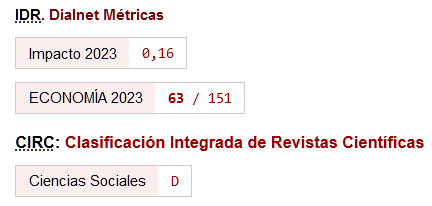La crisis del euro y su futuro
Keywords:
Euro, crisis, twilight, breakup, alternativesAbstract
This article analyzes the recent euro crisis, its causes and consequences, and also which type of available alternatives may be find out as an exit of that crisis: from a more effective integration of economic and monetary union to a possible breakup of it in a greater or lesser degree.
Downloads
References
Artus, Patrick (2011): "Taux de change de l'euro et désindustrialisation", Flash Economie. Recherche Économique. Natixis, nº 302.
Artus, Patrick (2013): "The paradox of the eurozone crisis: It has not led to a correction of heterogeneity through an adjustment of costs; it has intensified heterogeneity through a relocation of production activity", Flash Economics. Economic Research. Natixis, nº 472,.
Artus, Patrick et Castillo, Jesús (2012): "Le calcul de l'Espagne", Flash Economie. Recherche Economique. Natixis, nº 500.
Auerback, Marshall (2011): "A United States of Europe or Full Exit from the Euro?", International Journal of Political Economy, vol. 39, nº 4, Winter, pp. 87-102. https://doi.org/10.2753/IJP0891-1916390404
Bagnai, Alberto (2012): Il tramonto dell'euro. Come e perché la fine de la moneta unica salverebbe democracia e benessere in Europa, Reggio Emilia: Imprimatur editore.
Barba, Aldo and De Vivo, Giancarlo (2013): "Flawed currency areas and viable currency areas: external imbalances and public finance in the time of the euro", Contributions to Political Economy, 32, pp. 73-95. https://doi.org/10.1093/cpe/bzt003
Bibow, Jörg (2012): "The Euro Debt Crisis and Germany's Euro Trilemma", Working Paper, Levy Economics Institute of Bard College, nº 721. https://doi.org/10.2139/ssrn.2060325
Blankenburg, Stephanie; King, Lawrence; Konzelmann, Sue; Wilkinson, Frank (2013): "Prospects for the eurozone", Cambridge Journal of Economics, 37, pp. 466-477. https://doi.org/10.1093/cje/bet015
Blyth, Mark, (2013): Austerity. The History of a Dangerous Idea, New York: Oxford University Press.
Bolkenstein, Frits (2013): "Bolkestein: i paesi tripla-A introducano una valuta parallela", Voci dalla Germania, Martedi, 8 ottobre (http://vocidallagermania.blogspot.com.es/2013/10/bolkestein-i-paesi-tripla-introducano.html).
Bootle, Roger (2012): "Leaving the euro: A practical guide", Capital Economics, London.
Brancaccio, Emiliano and Realfonzo, Riccardo., (promotores) (2013): "The economists' warning", Financial Times, September 23.
Bricall, Josep M. (2013): "Los problemas de la moneda común europea" en Bricall, Josep M. (2013): Cinco ensayos sobre la crisis y sus consecuencias para el estado del bienestar, Barcelona: RBA, pp. 157-207.
Chen, Ruo et al. (2012): "External Imbalances in the Euro Area", IMF Working Paper, WP/12/236, September. https://doi.org/10.5089/9781475524673.001
Corsi, Marcella e Guarini, Giulio (2010): "Le cause reali delle crisi finanziarie: l'approccio di Paolo Sylos Labini", Studi e Note di Economia, Anno XV, nº 3, pp 389-412.
De Grauwe, Paul (2011a): "The Governance of a Fragile Eurozone", CEPS Working Documents, nº 346, May. https://doi.org/10.2139/ssrn.1898618
De Grauwe, Paul (2011b): "Managing a Fragile Eurozone", CESifo Forum 2, pp.40-45. https://doi.org/10.1111/j.1467-8462.2012.00691.x
De Grauwe, Paul (2011c): "The European Central Bank: Lender of Last Resort in the Government Bond Markets", CESifo Working Paper, nº 3569, September. https://doi.org/10.2139/ssrn.1927783
De Grauwe, Paul (2011d): "European Monetary Union", in Eds. Durlauf, S. N. and Blume, L. E.: The New Palgrave Dictionary of Economics, Online Edition:, Palgrave Macmillan, 05 October.
https://doi.org/10.1057/978-1-349-95121-5_2011-2
De Grauwe, Paul (2013a): "Design Failures in the Eurozone: Can they be fixed?", LEQS PaperNº 57, The London School of Economics and Political Science, February. https://doi.org/10.2139/ssrn.2215762
De Grauwe, Paul (2013b): "Pool debt, or face dangerous upheavals across Europe", Friends of Europe, March.
De Grauwe, Paul (2013c): "Design Failures, in the Eurozone -can they be fixed?", European Economy, Economic Papers, 491, April, European Commission. https://doi.org/10.2139/ssrn.2215762
De Grauwe, Paul and Ji, Yuemei., (2013a): "More evidence that financial markets imposed excessive austerity in the eurozone", CEPS Commentary, February 5th.
De Grauwe, Paul and Ji, Yuemei (2013b): "Panic-driven austerity in the Eurozone and its implications" Voxeu, February 21st.
De Grauwe, Paul and Ji, Yuemei (2013c): "The Legacy of Austerity in the Eurozone", CEPS Commentary, 4 October.
Dor, Eric (2013): "The launch of the euro brought about an impressive decrease of manufacturing in France and huge losses of market shares" IESEG Working Papers Series, ECO-07, June.
Dornbusch, Roger (1996): "Euro Fantasies: Common Currency as Panacea", Foreign Affairs, Vol. 75, nº 5, pp 110-124, September-October. https://doi.org/10.2307/20047747
European Solidarity Manifesto (2013): "European Solidarity in the face of the eurozone crisis: Controlled Segmentation of the Eurozone in order to Preserve the Most Valuable Achievements of European Integration", European Solidarity Manifesto, Brussels, 24th January (http://european-solidarity.eu/esm.php).
Feldstein, Martin (1997): "EMU and International Conflict", Foreign Affairs, vol. 76, nº 6, pp 60-73, November-December. https://doi.org/10.2307/20048276
Fitoussi, Jean-Paul (2013): Le théorème du lampadaire, Paris: Éditions les Liens Qui Libérent.
Fitoussi, Jean-Paul., Saraceno, Francesco (2010): "Inequality and Macroeconomic Performance", OFCE/POLHIA Nº 2010-13, July.
Fitoussi, Jean-Paul and Saraceno, Francesco (2013): "European economic governance: the Berlin-Washington consensus", Cambridge Journal of Economics, 37, pp. 479-496.
https://doi.org/10.1093/cje/bet003
Frenkel, Roberto and Rapetti, Martin (2009): "A developing Country View of the Current Global Crisis: What Should Not Be Forgotten And What Should Be Done", Cambridge Journal of Economics, 33 (4), pp. 685-702. https://doi.org/10.1093/cje/bep029
Galí, Jordi (2012): "Entrevista" por Trillas, Ariadna, Diari ARA, 2 de juliol (http://www.ara.cat/economia/Jordi_Gali-CREI-crisi-euro-UE-Grecia-Keynes-sistema_financer_0_710929121.html).
Gave, Charles (2013): "Europe: The Last Great Potemkin Village Where "The Rich Get Richer", And Poor Get Poorer'", GKResearch, Zero Hedge, February 10th.
Godley, Wynne (1992): "Maastricht and All That", London Review of Books, Vol 14, Nº 19, October, pp.3-4.
Godley, Wynne and Izurieta, Alex (2004): "Balances, Imbalances and Fiscal Targets. A New Cambridge View", CERF and UNDP.
Godley Wynne.and Lavoie Marc (2007): "A Simple Model of Three Economies with Two Currencies: The Eurozone and the USA", Cambridge Journal of Economics, 31, pp. 1-23.
https://doi.org/10.1093/cje/bel010
Gutiérrez, Eduardo, Ayala, Iván H., Albarracín, Daniel, Montes, Pedro: (2012): Qué hacemos con el euro, Madrid, Akal.
Hannsgen, Greg and Papadimitriou, Dimitri B. (2012): "Fiscal Traps and Macro Policy After the Eurozone Crisis", Public Policy Brief, nº 127, Levy Economics Institute of Bard College.
Hein, Eckhard (2012): "Finance-dominated capitalism, re-distribution and the financial and economic crises: A European perspective", Working Paper Institute for International Political Economy, No. 14/2012, Berlin.
Jorung, Lars and Drea, Eoin (2009): "The Euro: It can't happen, It's a bad idea, It won't last. US Economists on the EMU, 1989-2002", European Economy, Economic Papers, nº 395, European Commission.
Kaldor, Nicholas (1971): "The Dynamics effects of the Common Market", The New Statesman, March 12th, reprinted in Kaldor Nicholas: Further Essays On Applied Economics, volume 6 of the Collected Economic Essays series, Chapter 12, pp 187-220.
Kawalec, Stephan and Pytlarczyk, Ernest (2013): "Controlled dismantlement of the Eurozone: A proposal for a New European Monetary System and a new role for the European Central Bank", National Bank of Poland, Working Paper nº 155. https://doi.org/10.2139/ssrn.2320440
Kelton, Stephanie A. and Wray, L. Randall (2009): "Can Euroland Survive?", Public Policy Brief, ,Nº 106, November, Levy Economics Institute of Bard College.
Kregel, Jan (2011): "Debtors' crisis or creditors' crisis? Who pays for the European sovereign and subprime mortgage losses", Public Policy Brief, nº 121, Levy Economics Institute of Bard College.
Krueger, Allan B. (2012): "The Rise and Consequences of Inequality in the United States", Center for American Progress, January 12.
Krugman, Paul (1998): "The euro: beware of what you wish for" in http://web.mit.edu/krugman/www/euronote.html.
Lavoie, Marc (2011): "The monetary and fiscal nexus of neo-chartalism: A friendly critical look", Department of Economics, University of Ottawa, October.
Lynn, Matthew (2012): "6 Reasons Spain will leave the euro first", Market Watch. The Wall Street Journal, May 30.
Mateo, Juan Pablo y Montero, Alberto (2012): Las finanzas y la crisis del euro. Colapso de la eurozona, Madrid: Editorial Popular.
Martín Seco, Juan Francisco (2013): Contra el euro. Historia de una ratonera, Barcelona: Península.
Meade, James E. (1957): "The Balance-of-Payments Problems of a European Free-Trade Area", The Economic Journal, 67, pp. 379-396. https://doi.org/10.2307/2227357
Montes, Pedro (2001): La historia inacabada del euro, Madrid: Trotta.
Mundell, Robert (1961): "A Theory of Optimum Currency Areas", American Economic Review, 51, pp. 657-665.
Nordvig, Jens J. (2013): The Fall of the Euro. Reinventing the Eurozone and the Future of Global Investing, New York: MacGrawHill.
Papadimitriou, Dimitri B. and Wray, L. Randall (2011): "Euroland in Crisis as the Global Meltdown Picks Up Speed", Working PaperNo. 693, October, Levy Economics Institute of Bard College .
https://doi.org/10.2139/ssrn.1946381
Papadimitriou, Dimitri B. and, Wray, L. Randall (2012): "Euroland's Original Sin", Policy Note, nº 8, Levy Economics Institute of Bard College.
Papadimitriou, Dimitri. B. et al.(2013): "The Greek Economic Crisis and the Experience of Austerity. A Strategic Analysis", Strategic Analysis, July, The Levy Economics Institute of Bard College.
Pasinetti, Luigi L. (2000): "Public Debt in the European Union Countries: Two ways of facing the problem" in Krishnakumar, Jaya and Ronchetti, Elvezio, edited by: Panel Data Econometrics: future Directions. Papers in Honour of professor Pietro Balestra, Amsterdam: Elsevier, pp. 317-327.
Pivetti, Massimo (2013): "On the gloomy European project: an introduction", Contributions to Political Economy, 32, pp. 1-10.
https://doi.org/10.1093/cpe/bzt002
Rajan, Raghuram. G. (2010): Fault Lines: How Hidden Fractures Still Threaten the World Economy, New Jersey, Princenton University Press.
https://doi.org/10.1515/9781400839803
Riera, Miguel (2012): ¿Salir del euro?. Preguntas (y respuestas) más frecuentes, El Viejo Topo.
Rodrik, Dani (2011): The Globalisation Paradox. Democracy and the Future of the World Economy, New York, W. W. Norton & Company. https://doi.org/10.1355/ae28-3k
Sapir, Jacques., (2011): "S'il faut sortir de l'Euro...", Document de Travail, Cermi-Ehess, 6 d'avril.
Scharpf, Fritz W. (2011): "Monetary Union, Fiscal Crisis and the Preemption of Democracy", MPlfG Discussion Paper, 11, Max-Planck-Institut Für Gesellschaftsforschung.
https://doi.org/10.2139/ssrn.1852316
Soy, Antoni (2001): "La Unió Econòmica Europea i el euro", en Soy, Antoni (2001): Economia Política i sobiranisme, Barcelona: Editorial Mediterrània, pp. 137-167.
Soy Antoni (2013): Sortir de l'euro per sortir de la crisi? Europa y Catalunya devant la crisi financera i la crisi de l'euro, Barcelona: Viena Edicions.
Stockhammer, Engelbert (2012): "Rising Inequality as a Root Cause of the Present Crisis", PERI Working Paper Series, num. 282, April.
Sylos Labini, Piero (2003): "Le prospettive dell'economia mondiale", Moneta e Credito, nº 223, pp 267-295.
Tepper, Jonathan (2012): "A primer on the Euro breakup: default, exit and devaluation as the optimal solution", Variant Perception, Febraury.
Tilford, Simon (2012): "Economic Recovery Requires a Better Deal for Labour", Centre for European Reform, November.
Tobin, James (1963): "Deficit, Deficit, Who's Got the Deficit?," The New Republic, Vol. 148, Issue 3, pp 10.
Torrero, Antonio (1996): "El esfuerzo de convergencia nominal para el conjunto de la economía española", Información Comercial Española, núm. 756, agosto-septiembre, pp. 51-60. Incluido como "Consecuencias del esfuerzo de convergencia nominal para el conjunto de la economía española" en Colino, José y García, Javier (Directores) (1998): España y Maastricht: ventajas e inconvenientes, Madrid: Editorial Civitas, pp. 155-174.
Treeck, Till van (2012): "Did inequality Cause the US Financial Crisis?", Working Paper IMK, nº 91, April.
Wolf, Martin (2012): "What was Spain supposed to have done?", Martin Wolf's Exchange Blog, Financial Times, June 25th.
Woo, David and Vamvakidis, Athanasios (2012): "Game Theory and Euro Breakup Risk Premium", Bank of America Merrill Lynch, July 10th.
Wray, Randall L. (2009): "The rise and fall of money manager capitalism: a Minskian approach", Cambridge Journal of Economics, 33, pp. 807-828. https://doi.org/10.1093/cje/bep024
Zezza, Gennaro (2012): "The impact of fiscal austerity in the Eurozone", Review of Keynesian Economics, Inaugural Issue, Autumn, pp. 37-54. https://doi.org/10.4337/roke.2012.01.03
Downloads
Published
How to Cite
Issue
Section
License
This licence allows third parties to share (copy and redistribute the material in any medium or format) and adapt (remix, transform and create from the material for any purpose, including commercial purposes), provided that authorship and first publication in this journal (The Journal, DOI of the work) is acknowledged, a link to the licence is provided, and it is stated whether changes have been made to the work.







